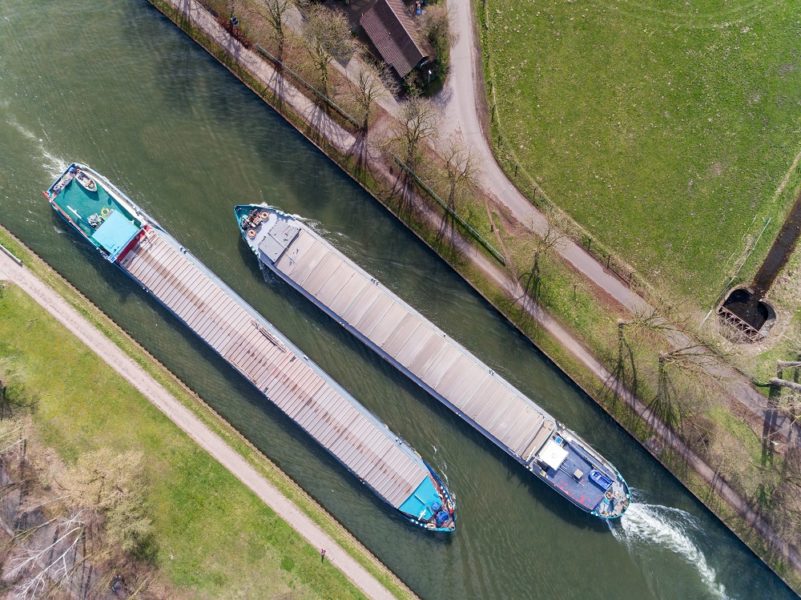CESNI meeting on 10 April 2019
10/04/2019

Strasbourg, 10 April 2019 – The European Committee for drawing up Standards in the field of Inland Navigation (CESNI) met in Strasbourg on Wednesday 10 April 2019; the meeting was chaired by Ms Lucia Luijten, representing the Netherlands. 11 Member States (Austria, Belgium, Czech Republic, France, Germany, Netherlands, Poland, Romania, Slovakia, Switzerland, United Kingdom), as well as the European Commission, the River Commissions (Moselle, Rhine) and 7 organisations approved by CESNI (Aquapol, EBU, EDINNA, ESO, ETF, GERC, IVR) participated in the meeting of the Committee.
New publications and updates in the field of technical requirements for vessels
The CESNI meeting on 10 April 2019 was an opportunity to adopt and inform participants about the publications on the CESNI website, in the field of technical requirements for vessels:
The explanatory notice of the amendments introduced in the European Standard laying down Technical Requirements for Inland Navigation vessels (ES-TRIN), edition 2019/1, was adopted and put online with the CESNI’s consent. This summary aims to document the needs and consequences that lie behind the amendments introduced by ES-TRIN 2019/1. The CESNI highlighted the value of this explanatory notice, which makes for transparency of information with participants and public alike.
The CESNI Secretariat is regularly requested by the public to provide information on the procedure for derogations and equivalences for technical requirements. In order to ensure transparent and comprehensive information, considering both EU and CCNR legal frameworks, the CESNI adopted a leaflet which it decided to publish on its website. The procedure described allows the possibility of gaining experience with pilot projects (e.g. alternative fuels) and actively supporting innovation and greening of the fleet.
In cooperation with the European Association of Internal Combustion Engine Manufacturers (EUROMOT), the CESNI updated the document on frequently asked questions (FAQ) which aims to help those involved in the sector to understand and implement the requirements that apply to inland navigation vessel engines under the new requirements of Regulation (EU) 2016/1628 on Non-Road Mobile Machinery (NRMM) and ES-TRIN. This new 2019 edition includes clarification regarding the use of specific engine categories (NRE and Euro VI), the reduced power engines and the exhaust after-treatment systems on new and existing engines.
Moreover, the CESNI confirmed its intention to soon publish guidelines on the procedure for checking the eligibility for installation of marinised engines (i.e. engines used for trucks or industrial applications which are converted to be installed on board inland navigation vessels).
ES-TRIN contains provisions for the approval of installations and equipment, as well as installation firms and technical services. Such approvals are the responsibility of the national authorities under the ES-TRIN and associated regulatory frameworks (i.e. Rhine vessel inspection regulations or Directive (EU) 2016/1629).
The CESNI launched the website listes.cesni.eu with the following objectives:
- to enable its members to exchange information on the approvals assigned at national level,
- to make it easier to inform the public about approved equipment and recognised firms,
- to facilitate the work of inspection bodies and enforcement authorities.
Furthermore, this new website contains information for public consideration about the inspection bodies and competent authorities for technical requirements for inland navigation vessels.
The Working Group CESNI/PT will examine in 2019 possible extensions to other equipment (e.g. anchors).
Debates on uniform models for certificates of qualification
In the field of professional qualifications, CESNI’s attention focused on the format of models of crew documents which shall be included into implementing acts no later than 17 January 2020, according to Article 34 of Directive (EU) 2017/2397, and they shall be taken up as annexes of the revised Regulations for Rhine Navigation Personnel (RPN). The new document models will be the concrete materialisation of the modernised regulation for professional qualifications aiming at making the sector more attractive and fit for the future.
The CESNI decided specifically to include in its agenda for the meeting in October 2019, the adoption of draft standards of models for:
- service record books,
- service record books combined with certificates of qualification (other than boatmaster),
- logbooks,
- certificates for practical examination, and
- certificates of qualification as a boatmaster and certificates of qualification as a liquefied natural gas (LNG) expert or passenger navigation expert.
Whereas Directive (EU) 2397/2017 requests the European Commission to submit to the European Parliament and to the Council an assessment of tamper-proof electronic service record books and logbooks by 17 January 2026, the electronic format was already proposed by the CESNI for certificates of qualification as a boatmaster and for certificates of qualification as passenger navigation expert and LNG expert.
CESNI’s experts argued that an electronic format can be created and signed electronically, accessible off-line on a computer, tablet or smartphone. The electronic format can easily be modified by a competent authority, in the event of a boatmaster obtaining additional qualifications such as specific authorisations for sailing with the aid of radar or sailing on stretches of specific risk. These certificates of qualification were previously covered by extra plastic cards for each qualification and now they are contained in one certificate following the CESNI model. Update is also easy when medical restrictions have to be modified. The e-certificate is also cheaper to issue and not limited in space as is an ID card format. A copy of the e-certificate can be printed by the holder of the document, whereas the original remains with the issuing authority (therefore no loss). Boatmasters, passenger navigation experts and LNG experts, as well as administrations, will benefit from less administrative burdens.
The CESNI proposed to leave the choice between a physical or electronic format to the holder, hoping that the electronic format will prevail very rapidly in the field of professional qualifications. It was felt that this initiative could pave the way for the electronic service record books and logbooks. In fact, a 2D barcode is already foreseen on the new physical certificates of qualification for all crew members and safety personnel, linking the certificate to the content of the European crew database. This will greatly facilitate controls of service record books issued after 17 January 2022, avoiding the situation where one person holds more than one proof of qualification.
Request for approval from the “European Maritime Heritage” (EMH) association
The CESNI decided to grant EMH the status of an approved non-governmental organisation for a tacitly renewable five-year term and invited the EMH to participate in CESNI’s future activities, particularly in the field of technical requirements for traditional vessels. EMH is a non-governmental, not-for-profit organisation for private owners of traditional ships as well as maritime museums and other interested bodies.
Work programme 2019-2021
Finally, the CESNI adopted several adjustments to its work programme 2019-2021, after further discussions on problem analyses. With this steering instrument, the CESNI commits to regularly revise existing standards and to adopt new ones to maintain and guarantee the high level of safety of European inland navigation, in particular as regards technical requirements for vessels and professional qualifications. Under this instrument, the Committee also commits to follow closely technical evolutions and support innovation, including alternative fuels, automation and modern tools for training and examination, as well as to support digitalisation of inland navigation. The CESNI also foresees several actions to support proper implementation of standards, including deliberation on uniform interpretation and publication of guidance documents. Lastly, the CESNI is ready to provide advice and analysis on priority topics regarding safe and sustainable inland navigation in view of possible future regulatory evolutions.

